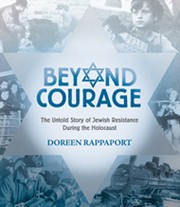Earlier this week, Richard Dean Rosen wrote about how he came to write his recently published book, Such Good Girls: The Journey of the Holocaust’s Hidden Child Survivors. He will be blogging here all week for Jewish Book Council’s Visiting Scribe series.
 The main subject of my book Such Good Girls: The Journey of the Holocaust’s Hidden Child Survivors had come very close to bowing out during the difficult process of submitting to my interviews about her largely suppressed experiences hiding in plain sight with her Jewish mother during World War II. All Sophie Turner-Zaretsky had to do was tell me “I can’t do this anymore,” and I would have had to “write off” a year or two of work. Fortunately, Sophie and the other subjects of my book gradually reconciled themselves to sharing their stories, and we all survived the book’s publication. Moreover, and happily, we survived as friends.
The main subject of my book Such Good Girls: The Journey of the Holocaust’s Hidden Child Survivors had come very close to bowing out during the difficult process of submitting to my interviews about her largely suppressed experiences hiding in plain sight with her Jewish mother during World War II. All Sophie Turner-Zaretsky had to do was tell me “I can’t do this anymore,” and I would have had to “write off” a year or two of work. Fortunately, Sophie and the other subjects of my book gradually reconciled themselves to sharing their stories, and we all survived the book’s publication. Moreover, and happily, we survived as friends.
Sophie even agreed to appear with me at a talk and reading I gave at a Barnes & Noble in Manhattan. I don’t know how often it’s happened that the subject — and impetus — of a nonfiction book has joined its author at a public event, but her appearance added a very moving dimension to the typical author reading.
“It’s not easy getting up in front of an audience to talk about a book about something as unspeakable as the Holocaust,” I told the audience. “It’s even less easy when the main character in your nonfiction book is sitting in the front row, looking at you as if to say, ‘And how the hell did I end up as the main character in your book?’” Later, I invited Sophie to the stage, where she gave flesh and blood to passages I’d just read about how she had not only passed as a Catholic between the ages of 5 and 11, but actually believed she was an anti-Semitic Polish schoolgirl while her mother, also passing as a Catholic and working for a Nazi functionary, feared daily for both of their lives.
The most emotional moment came when Sophie told the audience of a hundred people how upsetting it had always been to her when others bemoaned the passivity of the Jewish people during the Holocaust, given the incredible courage and resourcefulness of people like her mother, who had singlehandedly saved their lives against all the odds.
The most surprising moment for me came when Sophie confessed to the audience something she had never confided in me: that the stress of cooperating with me on the book had prompted her to take an antidepressant for the first time in her life. She had come to understand that the value of recording the experience of hidden survivors as children, and later as adults, was worth the personal misery stirred up by the book. I will always be indebted to “good girls” Sophie, Flora Hogman, and Carla Lessing for bearing with me as I committed their sagas to posterity.
As Sophie said when I once asked her if it was okay for The New York Post to publish an excerpt from the book, “Well, I guess it’s too late to go back into hiding.”
Richard Dean Rosen has written many books, but none presented more challenges than Such Good Girls: The Journey of the Holocaust’s Hidden Child Survivors. It’s a book that neither he initially wanted to write nor his subjects wanted written, but fate and the author’s own hidden agenda intervened.
Related Content:
- Writing About The Holocaust by Margareta Ackerman
- How a Former Catholic Priest Gained a New Understanding of the Holocaust by Salvatore Tagliareni
- Preserving the Mystery by Menachem Z. Rosensaft


